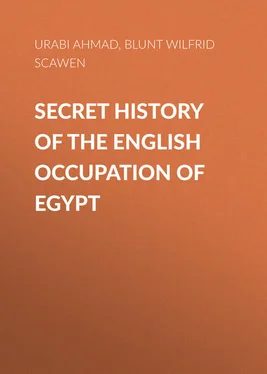Wilfrid Blunt - Secret History of the English Occupation of Egypt
Здесь есть возможность читать онлайн «Wilfrid Blunt - Secret History of the English Occupation of Egypt» — ознакомительный отрывок электронной книги совершенно бесплатно, а после прочтения отрывка купить полную версию. В некоторых случаях можно слушать аудио, скачать через торрент в формате fb2 и присутствует краткое содержание. Жанр: foreign_antique, foreign_prose, Историческая проза, на английском языке. Описание произведения, (предисловие) а так же отзывы посетителей доступны на портале библиотеки ЛибКат.
- Название:Secret History of the English Occupation of Egypt
- Автор:
- Жанр:
- Год:неизвестен
- ISBN:нет данных
- Рейтинг книги:4 / 5. Голосов: 1
-
Избранное:Добавить в избранное
- Отзывы:
-
Ваша оценка:
- 80
- 1
- 2
- 3
- 4
- 5
Secret History of the English Occupation of Egypt: краткое содержание, описание и аннотация
Предлагаем к чтению аннотацию, описание, краткое содержание или предисловие (зависит от того, что написал сам автор книги «Secret History of the English Occupation of Egypt»). Если вы не нашли необходимую информацию о книге — напишите в комментариях, мы постараемся отыскать её.
Secret History of the English Occupation of Egypt — читать онлайн ознакомительный отрывок
Ниже представлен текст книги, разбитый по страницам. Система сохранения места последней прочитанной страницы, позволяет с удобством читать онлайн бесплатно книгу «Secret History of the English Occupation of Egypt», без необходимости каждый раз заново искать на чём Вы остановились. Поставьте закладку, и сможете в любой момент перейти на страницу, на которой закончили чтение.
Интервал:
Закладка:
For the first few years of my retirement from the service I occupied myself entirely with my domestic affairs, and, as I have said, it was only by accident that my mind was gradually turned to politics. In 1873, finding myself in indifferent health, and to escape a late spring in England, I made with my wife our first common journey in Eastern lands. We went by Belgrade and the Danube to Constantinople, where we found Sir Henry Elliott at the Embassy and renewed acquaintance with other friends connected with it, among them with Dr. Dickson, of whom I shall have afterwards to speak in connection with the tragical death of Sultan Abd-el-Aziz, and who attended me with great kindness during a sharp attack of pneumonia I had there and for whom I contracted a sincere regard. The Ottoman Empire was then enjoying a period of comparative tranquillity before the storm of war which was so soon to burst over it, and I troubled myself little with its internal broils, but my sympathies, such as they were at that time, were, in common with those of most Englishmen of the day, with the Turks rather than the Christians of the Empire. On my recovery from my illness, I bought half a dozen pack horses at the At-maidan, the horse market at Stamboul, and with them we crossed over to Scutari and spent six pleasant summer weeks wandering in the hills and through the poppy fields of Asia Minor, away from beaten tracks and seeing as much of the Turkish peasant life as our entire ignorance of their language allowed. We were impressed, as all travellers have been, with the honest goodness of these people and the badness of their Government. We judged of the latter by what we saw of the ways of the Zaptiehs, our semi-military escort, whose manner with them was that of soldiers in an invaded country. Yet it was clear that with much fiscal oppression a large personal liberty existed in rural Turkey for the poor, such as contrasted not unfavourably with our own police and magistrate-ridden England. The truth is that everywhere in the East the administrative net is one of wide meshes, with rents innumerable through which all but the largest fish have good chance of escaping. In ordinary times there is no persecution of the quite indigent. I remember telling some peasants, who had complained to me through my Armenian dragoman of hardship in their lives at Government hands, that there were countries in still worse plight than their own, where if a poor man so much as lay down by the roadside at night and got together a few sticks to cook a meal he ran the risk of being brought next day before the Cadi and cast into prison; and I remember that my listeners refused to believe my tale or that such great tyranny existed anywhere in the world. My deduction from this incident is the earliest political reflection I can remember making in regard to Eastern things.
The following winter – that is to say, the early months of 1874 – we spent in Algeria. Here we assisted at another spectacle which gave food for reflection: that of an Eastern people in violent subjection to a Western. The war in which France had just been engaged with Germany had been followed in Algeria by an Arab rising, which had spread to the very outskirts of Algiers, and the Mohammedan natives were now experiencing the extreme rigours of Christian repression. This was worst in the settled districts, the colony proper, where the civil administration was taking advantage of the rebellion to confiscate native property and in every way to favour the European colonists at the native expense. With all my love for the French (and I had been at Paris during the war, and had been enthusiastic for its defence at the time of the siege) I found my sympathies in Algeria going out wholly to the Arabs. In the Sahara, beyond the Atlas, where military rule prevailed, things were somewhat better, for the French officers for the most part appreciated the nobler qualities of the Arabs and despised the mixed rascaldom of Europe – Spanish, Italian, and Maltese as well as their own countrymen – which made up the "Colonie." The great tribes of the Sahara were still at that time materially well off, and retained not a little of their ancient pride of independence which the military commandants could not but respect. We caught glimpses of these nomads in the Jebel Amour and of their vigorous way of life, and what we saw delighted us. We listened to their chauntings in praise of their lost hero Abd-el-Kader, and though we misunderstood them on many points owing to our ignorance of their language, we admired and pitied them. The contrast between their noble pastoral life on the one hand, with their camel herds and horses, a life of high tradition filled with the memory of heroic deeds, and on the other hand the ignoble squalor of the Frank settlers, with their wineshops and their swine, was one which could not escape us, or fail to rouse in us an angry sense of the incongruity which has made of these last the lords of the land and of those their servants. It was a new political lesson which I took to heart, though still regarding it as in no sense my personal affair.
Such had been the preliminary training of my life, and such its main circumstances when, as I have said, in the winter of 1875-6 I first visited Egypt. The only other matter which, perhaps, deserves here a word of explanation to non-English readers, and it is one that in Europe will receive its full appreciation, is the fact that my wife, Lady Anne Blunt, who accompanied me on all these travels, was the grandaughter of our great national poet, Lord Byron, and so was the inheritor, in some sort, of sympathies in the cause of freedom in the East, which were not without their effect upon our subsequent action. It seemed to us, in presence of the events of 1881-2, that to champion the cause of Arabian liberty would be as worthy an endeavour as had been that for which Byron had died in 1827. As yet, however, in 1875, neither of us had any thought in visiting Egypt more serious than that of another pleasant travelling adventure in Eastern lands. We had on leaving England the plan of entering Egypt from the south, by way of Suakim, Kassala, and the Blue Nile, and so of working our way northwards to Cairo in the spring, but this, owing to the issue, just then so unfortunate to Egypt, of the Abyssinian campaign, was never realized, and the only part of our program which we carried out was that instead of landing at Alexandria, as was then the universal custom, we went on by the Canal to Suez and there first set foot upon Egyptian soil.
My first impression of all of Egypt is of our passage on the last day of the year 1875 through Lake Menzaleh, at that time the unpersecuted home of innumerable birds – a truly wonderful spectacle of prodigal natural life – to a point on the Canal north of Ismaïlia. What a sight it was! Lake Menzaleh was still an almost virgin region, and the flocks of flamingos, ducks, pelicans, and ibises which covered it, passed all belief in their prodigious magnitude. The waters, too, of the lakes and of the Canal itself were alive with fish so large and in such great quantities that not a few were run down by our ship's bows in passing, while everywhere they were being preyed on by fish hawks and cormorants, which sat watching on the posts and buoys. I imagine that the letting in of the sea for the first time on land never before covered with water provided the fish with feeding ground of exceptional richness, an advantage which has since been lost. But certain it is that both fish and birds have dwindled sadly since, and it seems unlikely that the splendid spectacle we saw that winter will be again enjoyed there by any traveller's eyes.
We landed at Suez in the first days of the year 1876, and the news of the great disaster which had overtaken the Egyptian army in Abyssinia was the first that greeted us. The details of it were not generally known, but it appeared that seven ortas, or divisions, of the Khedivial troops had perished, while a tale was in circulation of the Khedive's son, Prince Hassan, having been captured and mutilated by the enemy, an exaggeration which was afterwards disproved, for the prince, a mere boy at the time, had been carried away from the battlefield of Kora early in the day, at the very beginning of the rout, as had Ratib Pasha himself, the Egyptian general in command, who was in charge of him. Loringe Pasha, however, the American, had really lost his life with many thousands of the rank and file, and the misfortune put a final limit to the Khedive Ismaïl's ambition of universal empire on the Nile. In our small way it affected us, as making our thought of a journey to Kassala impossible, and deciding us on a less adventurous one immediately in Lower Egypt.
Читать дальшеИнтервал:
Закладка:
Похожие книги на «Secret History of the English Occupation of Egypt»
Представляем Вашему вниманию похожие книги на «Secret History of the English Occupation of Egypt» списком для выбора. Мы отобрали схожую по названию и смыслу литературу в надежде предоставить читателям больше вариантов отыскать новые, интересные, ещё непрочитанные произведения.
Обсуждение, отзывы о книге «Secret History of the English Occupation of Egypt» и просто собственные мнения читателей. Оставьте ваши комментарии, напишите, что Вы думаете о произведении, его смысле или главных героях. Укажите что конкретно понравилось, а что нет, и почему Вы так считаете.












